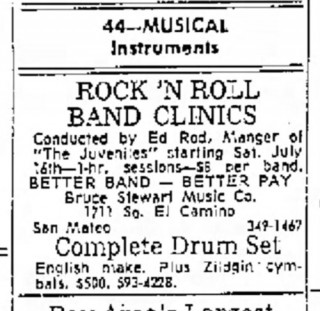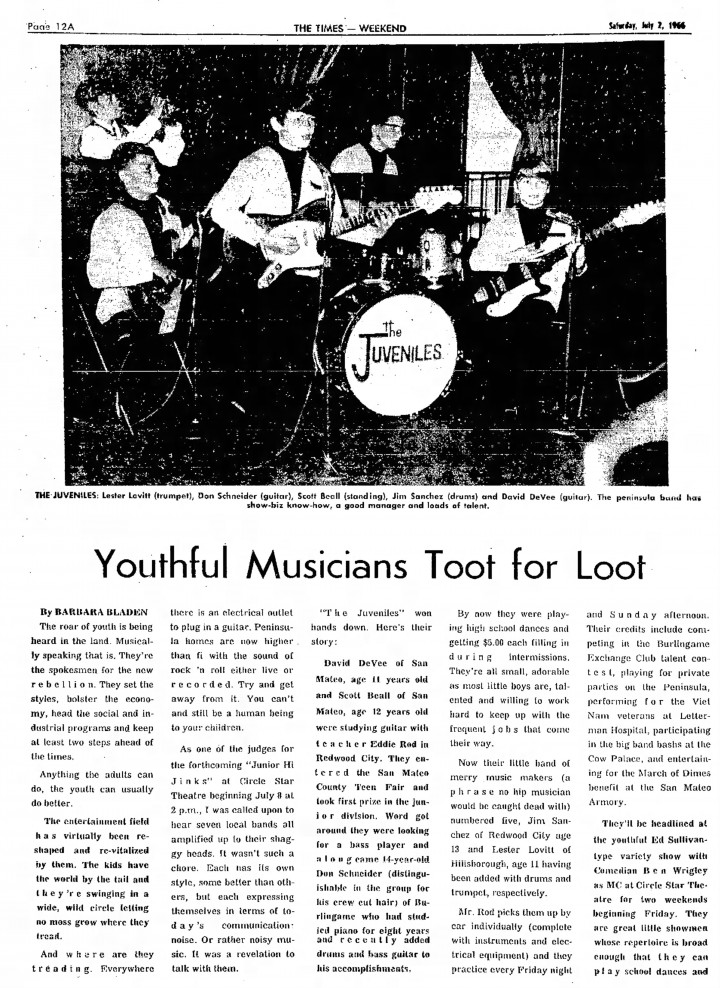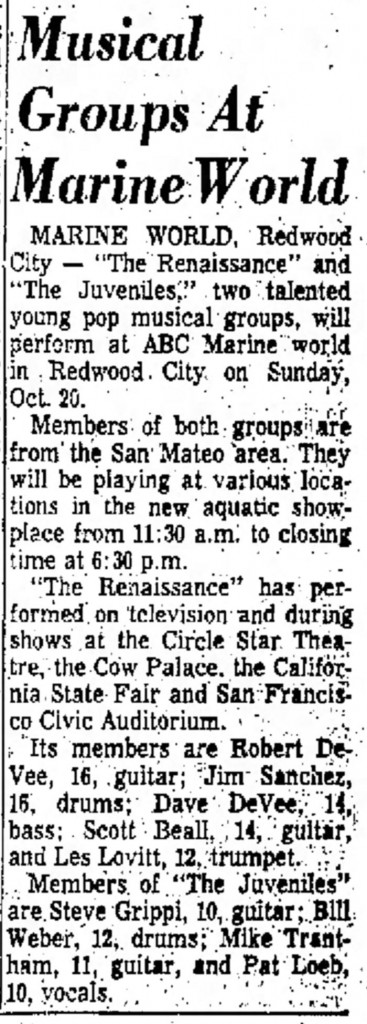
The Far End in 1967. From left: Joe Costa, lead guitar; Tommy Broadfoot (wearing hat), drums; Frank Demascio, bass; John Berg (standing to right in foreground), lead singer & rhythm guitarThe Far End formed at La Habra High School in Orange County, southeast of downtown Los Angeles. Lead singer and rhythm guitarist John Berg is generously sharing a few songs they recorded at home.
“Don’t Invite Me Over” has a great, crude quality to its sound. The chords and verse put me in mind of Simply Saucer, and the solos have all the intense fury of the Velvet Underground. Their version of “Gloria” is solid, with Tommy Broadfoot’s steady drumming and nice guitar trills by Joe Costa, and John doesn’t hold back on the vocals. “Please Don’t Say” shows the versatility of the band, and the harmonica solo isn’t as bad as John makes it out to be.
Other songs on the tape include versions of the Beatles’ I Feel Fine, It’s Only Love and That Boy; Buffalo Springfield’s For What It’s Worth and the Dave Clark Five’s Because.
John writes about the band:
I was lead singer/rhythm guitarist in “The Far End” between 1966-’68, based in La Habra, California (Orange County, between Fullerton and Whittier.)
Our music started off strongly influenced by a weird mixture of Beatles, Stones, Dave Clark Five, Them, the Standells, and some surf and wedding party music our guitarist Joe Costa insisted we play. Gradually we became more “psychedelic” though our actual musical talent never quite matched the sounds we heard in our heads.
We were a 4 piece “living room band”, i.e. we rarely made it even out to the garage — though we did play the Hollywood Teen Fair two Springs in a row, the second time (’67) as the “demo band” at the Sunn Amplifiers booth. We played a few other local “gigs” including the opening of a pizza parlor on Whittier Blvd – performing outside in the parking lot to hardly anybody beyond family members — and a few other similar occasions.
Our real passion was writing songs — more than 50, of which we only managed to record a couple onto a Sony reel to reel machine in my living room in the spring of ’67. Actually, we also cut two originals to tape at the JBL booth at the ’67 Hollywood Teen Fair, but the girlfriend of our lead guitarist Joe “borrowed” the tape to play for some friends and promptly lost (or perhaps destroyed?) it, so I never even got to hear it.
I have a whole 3 ring notebook full of sheets of paper containing the lyrics for the songs that I and Joe Costa co-wrote, none of which ever got recorded other than these two originals, “Don’t Invite Me Over” and “Please Don’t Say” (wretched harmonica “solo” by yours truly) and of course our take on “Gloria” since Van was my #1 fave singer of the era.
We were heading more and more into the “psych zone” but girlfriends, college classes, jobs and sundry other things got in the way of our actually getting to record this music. I did write down the chords alongside the lyrics, but can only recall how a few of the songs actually went. One song, “Joy Ride”, was heavily influenced by The Doors (who I first saw in early June 1966 when they opened for Them at The Whiskey A Go Go in Hollywood).
Please Don’t Say does indicate the part of our band persona that was pop/Beatles-influenced, whereas the other two songs show off our more blues/garage side. The unrecorded stuff covered all these veins and more, though certainly we were heading more in the “psych” direction — or at least as much as we were capable of in terms of “chops”. That photo is the only one that has survived the rages of 40 years.
I recently was able to reconnect with my old La Habra High School class of 1966 mate Mike Lewis, who was lead guitarist in the band The New Breed that has three tracks on the recent Big Beat label CD It Came From The Garage [including the great I Got Nothin’ To Say To You] .
Over the ensuing years I continued as a fan of all the musicians who played in the ranks of Them and was able to make contact with several of them, which led in the mid-1990s to me and my friend Neal Skok releasing a CD by the band “Truth” that compiled tracks cut in 1970 by three ex-Them members — same guys who were on the two “Them” albums on the Tower label that have more recently been reissued by Rev-Ola. The music of “Truth” is really much more well-realized than either of those two Tower albums — we only recently made the CD available in case you want to check it out.
The Far End – Don’t Invite Me Over
The Far End – Gloria
The Far End – Please Don’t Say

























